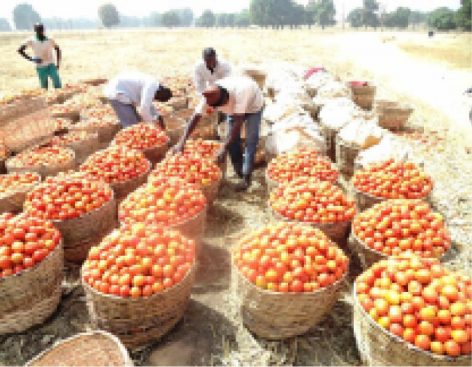Business
Why News Of Tomato Import Ban No Longer Interests Farmers

In the last seven years, news of banning tomato paste and concentrate importation has always been in the media, most times, dying down after two weeks.
Several summits have been held around the country trying to seek answers to the numerous problems that characterize the tomato industry.
Last week, the Minister of Agriculture and Rural Development, Chief Audu Ogbeh, during the first Kano Tomato Summit said that by the end of 2019, the Federal Government will ban the importation of tomato paste and concentrate into the country.
Chief Ogbeh who was also at the Kadawa Irrigation Valley in Kura Local Government of Kano State, which has thousands of tomato farmers as well as the Dangote Tomato factory on Monday, said effort is been intensified to revolutionize tomato production.
Also at the inspection and commissioning of Gino Tomato Paste factory and farm in Faka, Kaduna State, Central Bank of Nigeria (CBN) Governor Godwin Emefiele and Chief Ogbeh repeated the commitment to ban the importation of the product.
Mr. Emefiele said Dangote and Gino farms have foreseen self-sufficiency in two years if the CBN and FG sustain the current drive to revamp the industry.
However, the news is no more new to the farmers as they have heard that before from different top government officials, as well as Ogbeh himself during the approval of the National Policy on Tomato by the Federal Executive Council in February 2017.
What might interest the farmers is perhaps the full implementation of the National Policy on Tomato approved in 2017 by the federal government, which failed to see the light of day in addition to some of the measures government is taking to spur domestic production and create a vibrant industry that will generate huge jobs in the country.
Currently, the nation’s domestic demand stands at 2.3 million tonnes every twelve months but the country produces about 1.7 million tonnes, leaving a gap of about 600,000 which is filled with the import of tomato paste, powder and concentrate mainly from China and Italy.
The import of tomato concentrate, powder and paste per annum gulps a whopping $170 million according to the National Investment Promotion Council.
However, Chief Ogbeh puts the current figure at over $22 billion on the importation of tomato paste from China annually, something that worries stakeholders in the country.
Although Nigeria is the second largest producer in sub-Saharan Africa behind Egypt which produces about 8.3 million metric tonnes, 40-45 percent of what is produced wastes away due to lack of processing facilities and poor infrastructure for value addition.
What will however bring succor to farmers is Ogbeh’s assurance that the Central Bank of Nigeria (CBN) through the Bank of Agriculture has penned down the sum of N250 billion for farmers under the CBN Anchor-borrower system.
But of more interest to farmers is the full implementation of the National Policy on Tomato which will address all the concerns of farmers and investors who have sunk in billions of naira into setting up facilities but cannot compete favorably with what is coming from China and Italy.
The National Secretary and Kano State Chairman of the Tomato Growers Association of Nigeria (TOGAN), Alhaji Sani Danladi Yadakwari, while speaking to Daily Trust in Kano, revealed that tomato growers in the country are facing many difficulties due to poor implementation of the February 2017 tomato policy approved by the Federal Executive Council.
Alhaji Sani said the farmers were in total support of the policy because it promotes employment, ensures self-sufficiency in production and promotes local processing of fresh tomato into concentrate and paste.
“Our excitement is, however, short-lived as two years after the FEC’s approval, there appear to be some notable forces against the full implementation of the policy. Specifically, and in spite of the Federal Ministry of Finance’s circular No, F17465/42, it is with dismay that the association has noticed that the Nigerian Custom is yet to fully implement the policy on restriction of importation of tomato paste/concentrate through the seaport and they are also reluctant to implement the $1,500 levy per metric tonne under code 2002.90.10.00 and 2002.19.100 of the policy,” he revealed.
He lamented that the poor implementation of the policy has robbed the government of over $400m in levy and import duty, adding “It is apparent that the local tomato sector will not develop as envisaged by the policy, a consequence of continuous dumping of imported and often adulterated tomato paste.”
Alhaji Yadakwari, however, stated that tomato farmers in Kano State in 2018 enjoyed a sizeable percentage of the state government’s intervention. He further revealed that tomato farmers have faced terrible moments with adulterated inputs, especially fertilizer, in addition to increase in the price of inputs and poor market.
Yadakwari said the farmers’ expectation in 2019 is to see effective implementation of the national tomato policy for robust tomato production in 2019.
Meanwhile, some stakeholders along the tomato value chain have commended the Federal Government’s support to the tomato value chain in the North and requested for similar support in the South-West.
In a communiqué issued at the end of a tomato value chain workshop held at the National Horticultural Research Institute (NIHORT) Ibadan on Wednesday, and signed by the project’s Principal Investigator, Dr. Dorcas Ibitoye, the stakeholders decried the high cost and unavailability of improved tomato seeds and agricultural inputs in the country.
